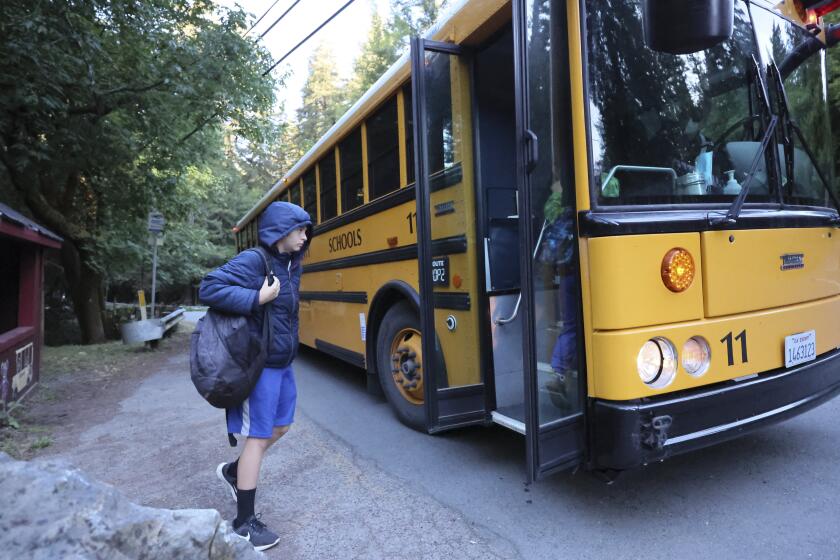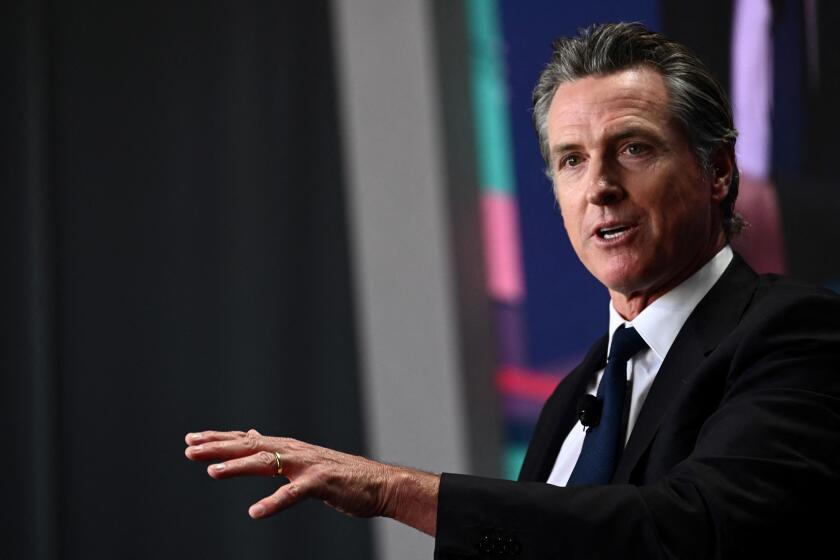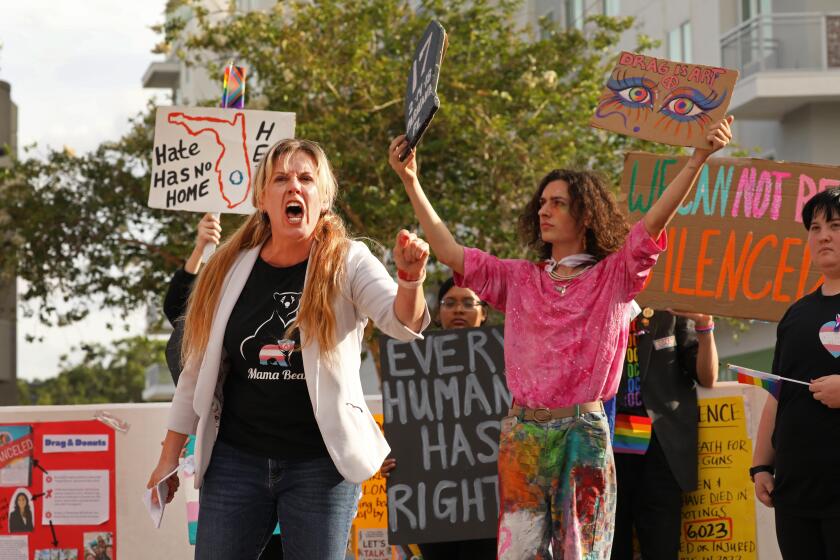Temecula school board outrage over LGBTQ+ lessons motivates Newsom to rush new textbook law
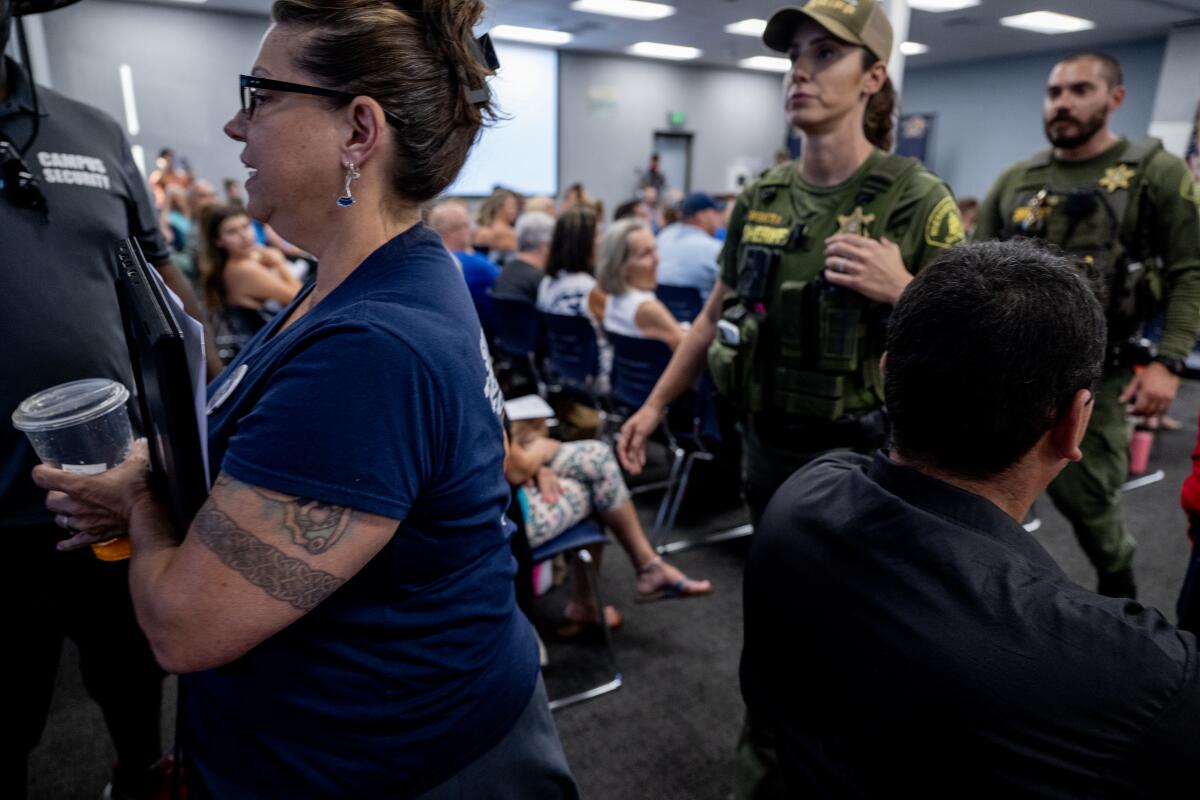
- Share via
SACRAMENTO — Two San Francisco Democrats were at the center of a chaotic school board meeting in Southern California on Tuesday: Gov. Gavin Newsom and slain gay rights leader Harvey Milk.
During the nine-hour Temecula Valley Unified meeting, which ran past midnight, some parents spoke in support of the conservative majority on the school board and its bucking of state standards for inclusive and diverse education.
They painted Newsom — who plans to send textbooks that reference Milk to Temecula students in defiance of the board — as a “tyrant” who “forces his rule” upon a district he knows nothing about. They called lessons about LGBTQ+ history “pornographic” and “obscene.”
The debate arose after the board rejected proposed instructional material that mentioned Milk, a member of the San Francisco Board of Supervisors and the first out gay man elected to public office in California, who was assassinated in 1978. Earlier this year, Newsom proclaimed May 22 to be Harvey Milk Day, to honor his activism done “at great personal risk.”
Conservative school board President Joseph Komrosky, who called Milk a “pedophile” and has been publicly feuding with Newsom over the issue, asked sheriff deputies on Tuesday to remove a teacher from the meeting after she called conservative board member Danny Gonzalez a “homophobe.”
Without evidence, Gonzalez said that proposed instruction would promote pedophilia and said he opposed teaching about the gay liberation movement that began in the 1960s because it’s “not appropriate to discuss sexuality.”
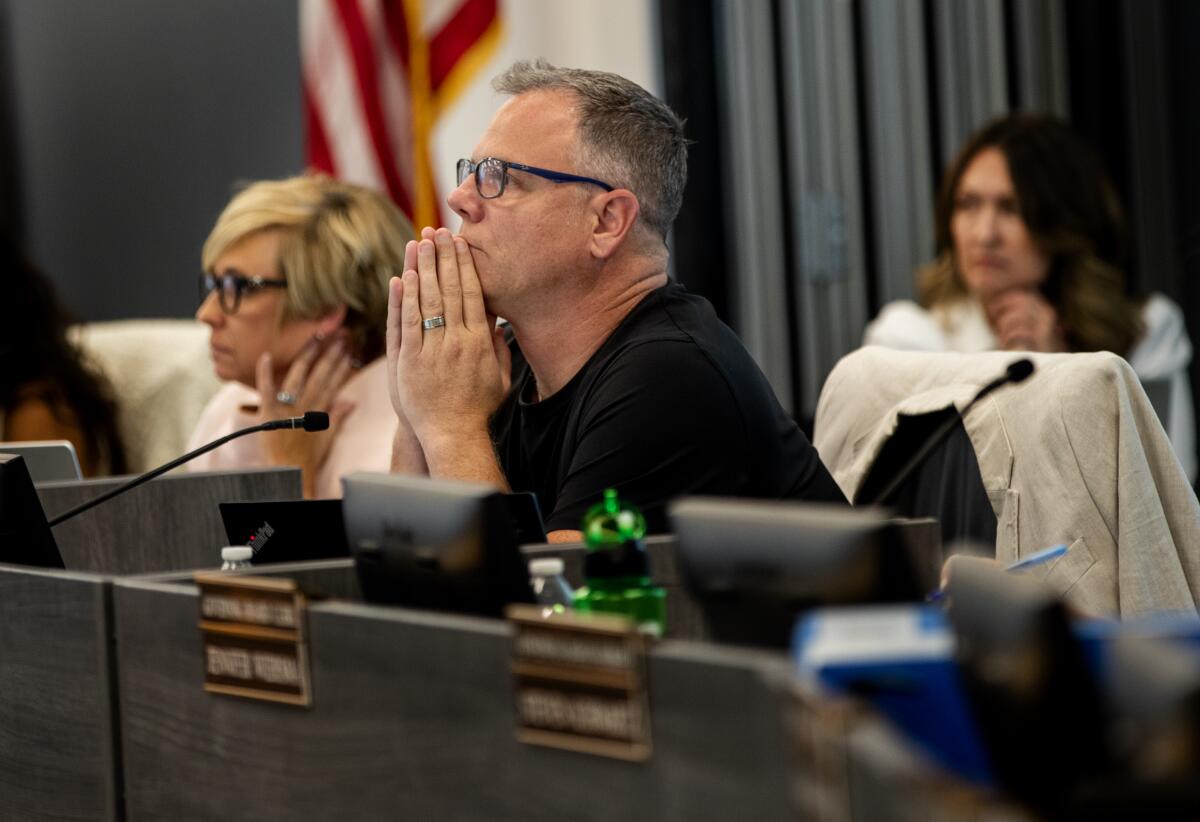
The meeting came days after the governor threatened to fine the Riverside County district $1.5 million for refusing to adopt compliant textbooks on the basis of the mention of Milk.
“I know you’re doing what’s right for our community when we have the governor making threats against our community,” Tim Thompson, a Temecula preacher who runs a conservative website and has been a vocal critic of Newsom, said at the school board meeting, receiving applause from the audience. “One of the things we’ve got to remember is we do have a thing called local control.”
The raucous meeting was a confluence of emotional political debates over book bans playing out across the country and the result of Republican efforts to win majorities on school boards.
Temecula and most of southwestern Riverside County lean Republican, favoring former President Trump in the 2020 election and creating a rift with California’s Democratic state leaders. In December, the school board voted to ban the teaching of critical race theory.
Conservatives running in school board races across California mostly fell short. Groups like the American Council say they’ll keep trying.
On Wednesday, Newsom announced that the state is entering into a contract to secure textbooks for the district in time for the first day of school next month.
“The three political activists on the school board have yet again proven they are more interested in breaking the law than doing their jobs of educating students — so the state will do their job for them,” Newsom said in a statement, reiterating his commitment to fining the district.
Newsom — a national voice against red state policies — was so inspired to take on Temecula conservatives that he has publicly vowed to hold the school district accountable on the basis of a law that does not yet exist.
He has rushed to craft legislation that, if passed, will give the state new power when it comes to textbooks — a direct response to the controversy in Temecula.
The bill, AB 1078, would allow the state to fine school districts that are out of compliance with textbook standards, and would create a process for the state to purchase “adequate” instructional materials for those districts.
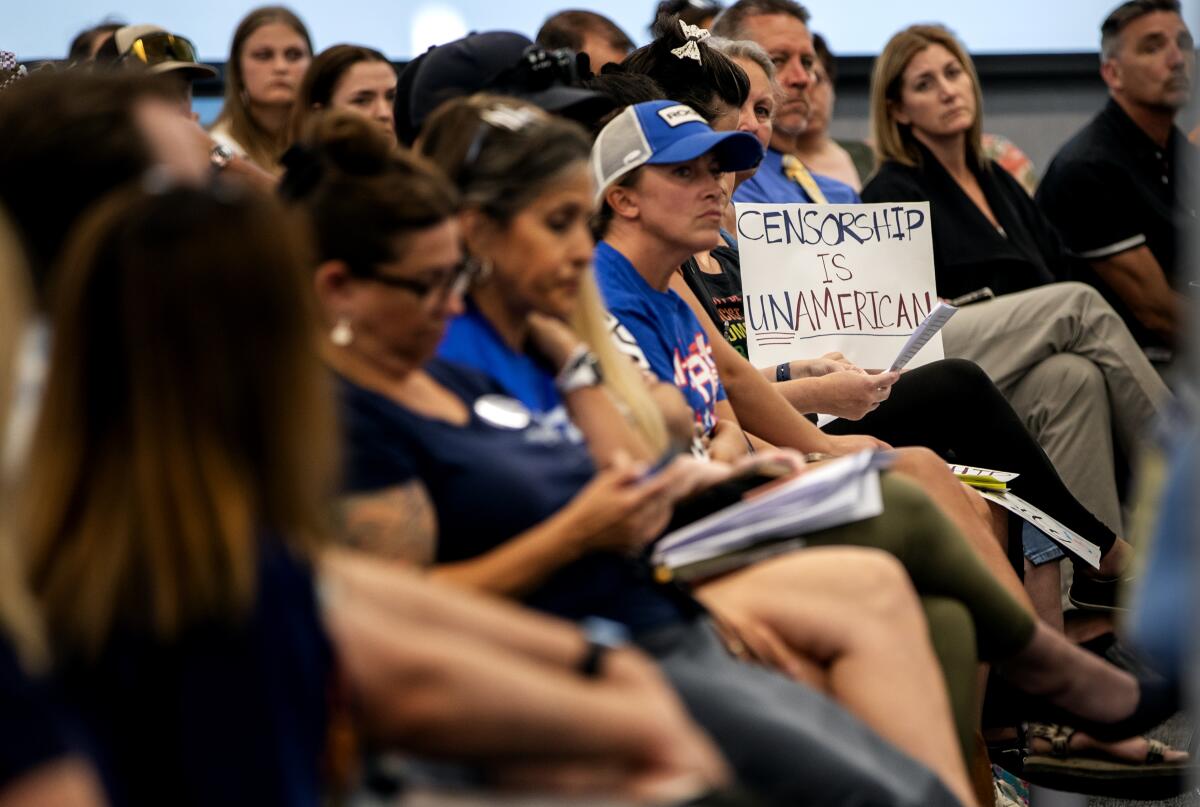
Newsom’s insertion into an issue at a school board that oversees about 28,000 students has drawn criticism from Republicans as well as some local officials who agree with California’s textbook laws but believe the state is overstepping.
Ali Shahrestani, an attorney and former teacher who specializes in education law in California and on the East Coast, said that while the state has long had laws regarding curriculum, the governor’s involvement at this level is rare. Newsom has now joined red state leaders like Florida Gov. Ron DeSantis in intervening in local school policies, albeit for very different reasons, Shahrestani said.
“It’s very rare to see a governor step in,” Shahrestani said. “It’s a local issue.”
“Cancel culture has gone too far in Temecula,” Gov. Gavin Newsom said Tuesday, regarding banned books in Temecula.
Others say the Temecula case is extreme and harmful to students, so Newsom’s involvement is necessary.
“I think it’s pathetic that the governor has stepped in because you guys aren’t doing your jobs,” Kristi McClure, a parent of two students in the district, told school board members Tuesday. “It’s not overreach; it’s not a violation of local control — it’s what happens at any business when an employee fails to do the basics of their job. The boss steps in.”
The whirlwind legislation has been met with resistance from the California School Boards Assn., which said that Newsom’s order circumvents the state’s existing textbook process and that he lacks “legal authority” to distribute books to Temecula on behalf of the state.
The organization, which supports inclusive lessons, said the legislation needs to address “unintended negative impacts” on school communities and “mitigate its encroachment” on local control.
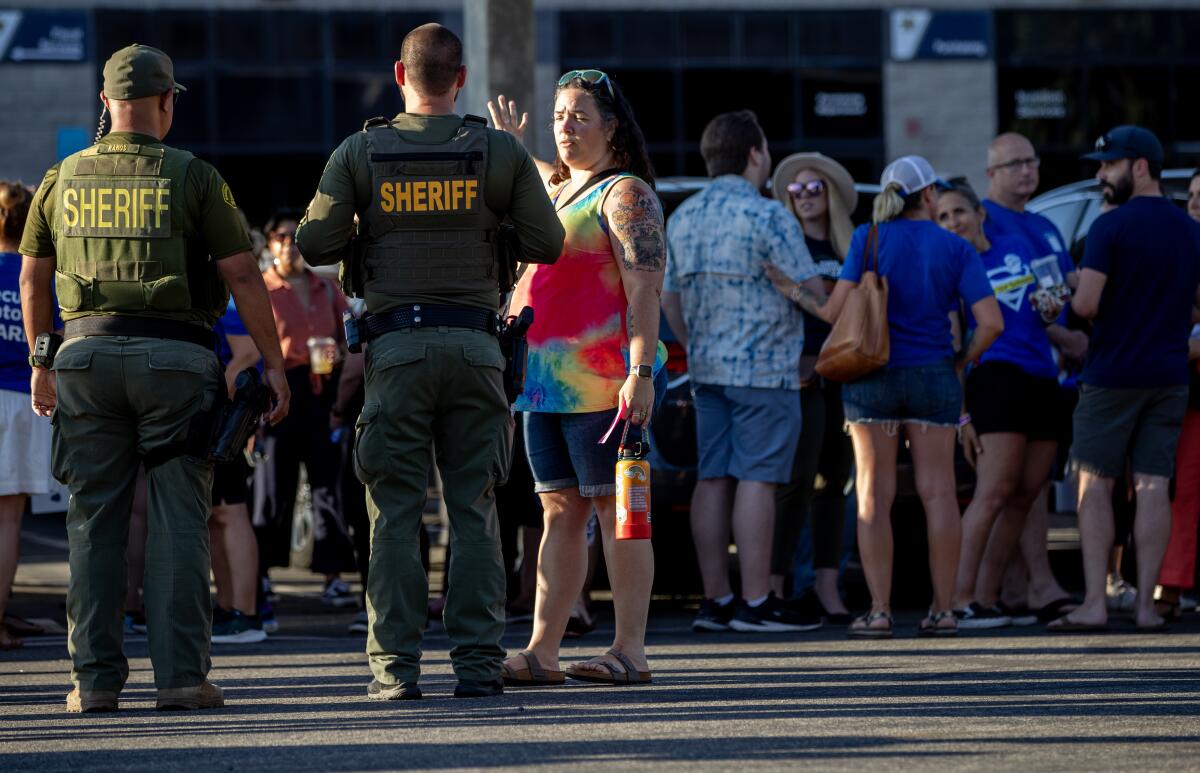
Izzy Gardon, a spokesperson for the Newsom administration, said California law already allows the state “broad power to procure goods for a public purpose.”
“Following passage of AB 1078, the state will then send the district the bill for the curriculum and fine the district for violating California law,” he said.
Negotiations are ongoing among the California School Boards Assn., Newsom and state Assemblymember Corey Jackson (D-Perris), the author of AB 1078.
In DeSantis they trust: Conservative parental groups and powerful politicians clash with parents, teachers and librarians who oppose the banning of books.
Jackson’s bill has been amended from his original version and tailored at the request of the governor to address the controversy in Temecula.
Jackson’s initial proposal to crack down on school boards that seek to ban textbooks attracted little support. Since the bill was introduced in February, the freshman lawmaker had watered down his plan, making many concessions in negotiations with education organizations.
That all changed last week when Newsom swooped in, reviving Jackson’s seemingly dead-on-arrival bill with immediate support from lawmakers including Senate leader Toni Atkins (D-San Diego) and Assembly Speaker Robert Rivas (D-Hollister).
“As an author, this is a dream come true,” Jackson said of the about-face in an interview Monday. “Some of these amendments are in direct response to what we are seeing in Temecula, but of course overall is the idea that California is trying to meet this moment. It’s not going to go away, and we have to start putting in some guardrails.”
Local school boards enjoy broad power in California, and education officials who launched a textbook task force last month acknowledged that overseeing enforcement at 10,000-plus schools is difficult.
Tim Taylor, executive director of the Small School Districts’ Assn., said it’s a “fine line” between ensuring state compliance and meddling with decisions by elected school board members.
“I think it’s a hill to die on for local districts, not to give up that local control,” Taylor said. “We’ve got 6 million kids in this state; it’s not one size fits all. If we go back to a state-driven system, it’s so bureaucratic it doesn’t make sense.”
Actor, author and ‘Reading Rainbow’ founder Levar Burton joins the L.A. Times Book Club to discuss the State of Banned Books.
But California’s historical reliance on local control doesn’t mean school boards can break the law, Gardon said.
The state is considered a leader in inclusive education, and has had extensive curriculum standards in place requiring diversity in school lessons, including mandates for comprehensive sex education and LGBTQ+ history.
GOP strategist Rob Stutzman said Newsom’s push for textbook legislation is good for the governor’s political profile more than it is necessary in a state already equipped with textbook laws.
“It’s all culture war politics,” Stutzman said. “It’s not about policy. It’s about making a law in order to serve a political end.”
California has a process to vet complaints about textbooks due to a settlement the state made following a lawsuit in 2000. As part of that process, the Los Angeles County Office of Education reported in 2022 that all of the 514 schools it reviewed “were found to have sufficient instructional materials.”
John Affeldt, an attorney for the nonprofit firm Public Advocates who worked on the lawsuit that led to that law, cast doubt on claims that Newsom’s move in Temecula is an overreach. He pointed to conservatives “creating conflict” over curriculum choices as a reason governors are compelled to step in now.
“I think it is within the governor’s authority, if the state becomes aware of a deficiency, to move to correct it,” Affeldt said. “As a constitutional matter, I think the law would support the state in being able to be more and more prescriptive. But for political reasons, the state, and elsewhere, has not tended to be so prescriptive, but has let locals exercise some discretion.”
For people like Jennee Scharf, the teacher who was removed from Tuesday’s school board meeting — and who is seeking to recall its conservative members — Newsom is a champion.
“They’re willing to ruin this community for their own political agenda, and that is why we need people to step in,” she said.
Newsom’s threats have so far not deterred the board, which again voted 3 to 2 on Tuesday to reject textbooks that had been approved by dozens of teachers and parents in a pilot program.
Staff photographer Gina Ferazzi contributed to this report from Temecula.
More to Read
Sign up for Essential California
The most important California stories and recommendations in your inbox every morning.
You may occasionally receive promotional content from the Los Angeles Times.
